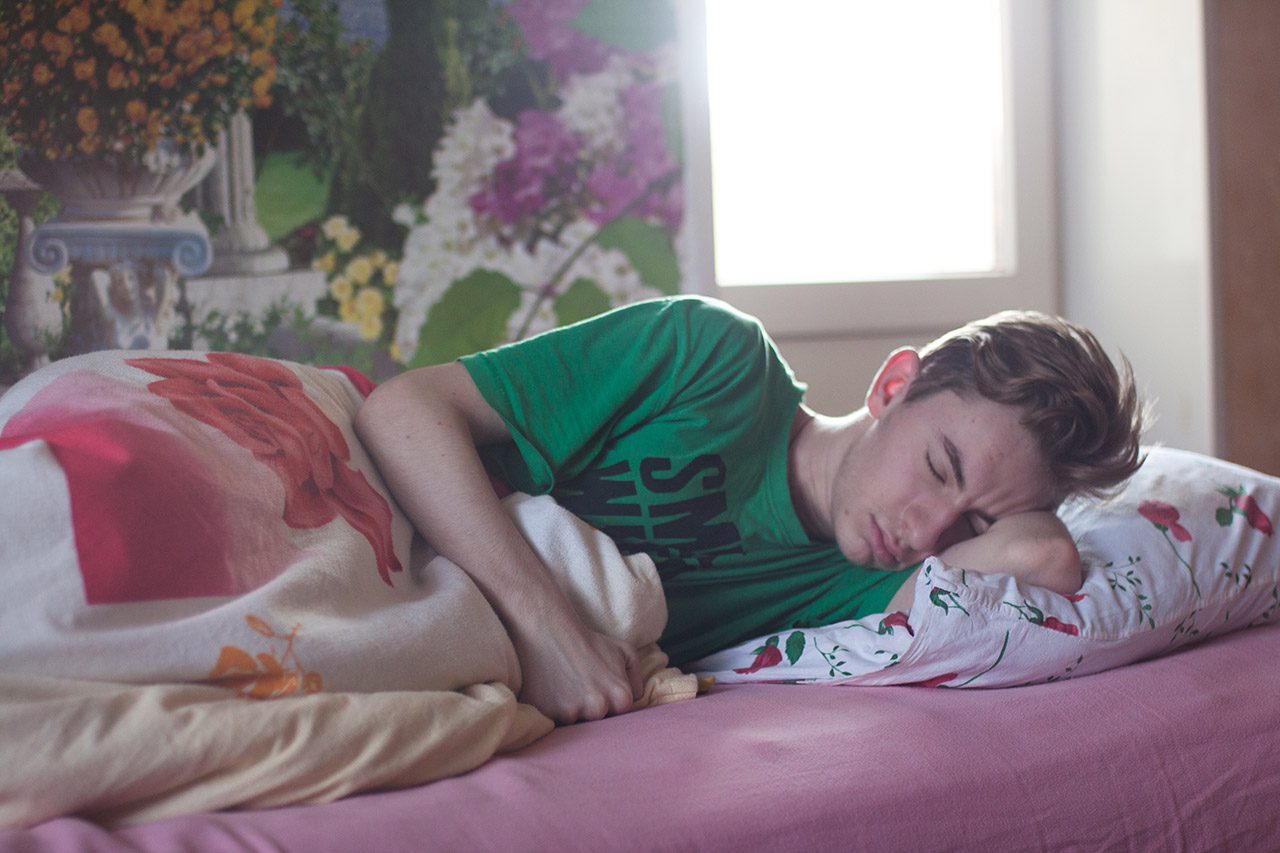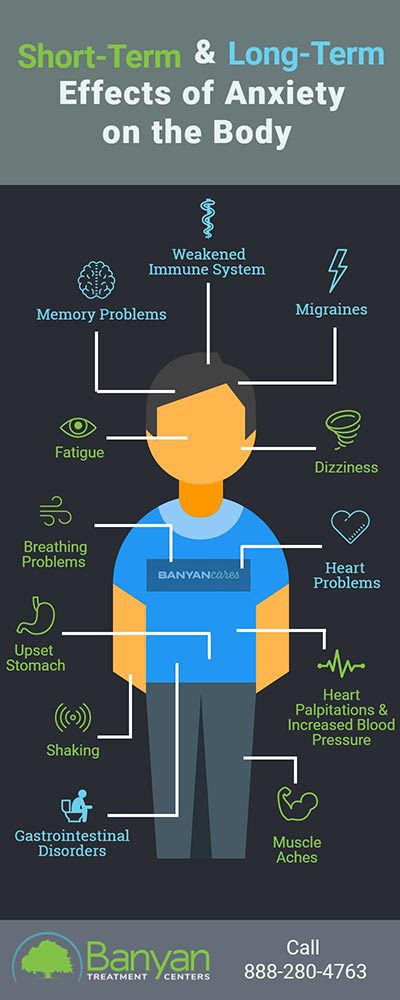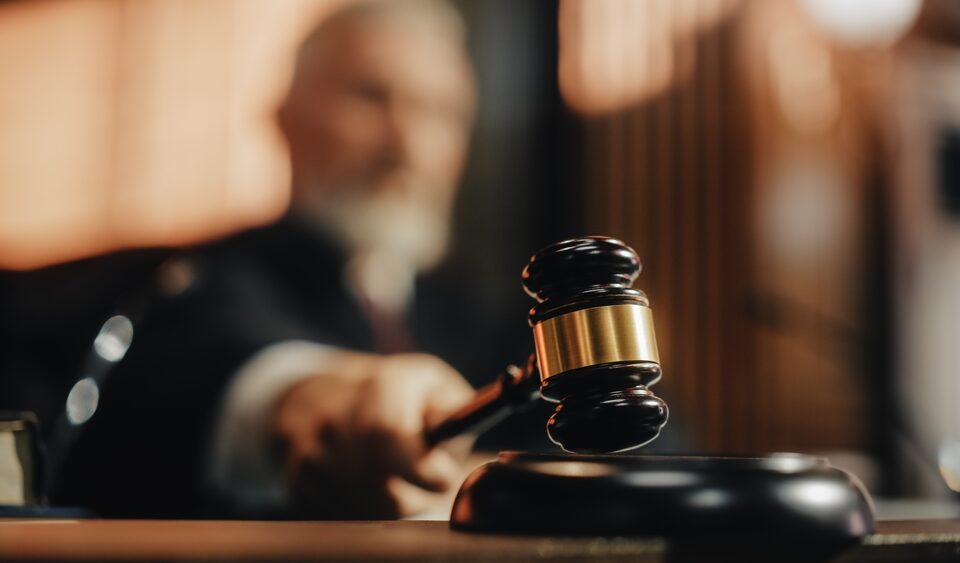


A Peek Into Lindsey Vonn’s Depression & Mental Health Problems
November 21, 2019

What Are OCD Dreams?
November 27, 2019Short Term and Long Term Effects of Anxiety


Anxiety is a common and frequently misdiagnosed mental health problem that can have a significant effect on an individual's well-being both in the short and long run. Although anxiety has evident short-term effects on the body, such as elevated heart rate and restlessness or uneasiness, its compounding long-term effects demand further attention. Over time, being in this continuous state of elevated stress can become deeply rooted in physiological issues, which may contribute to a variety of physical health problems. The experts at our Banyan facilities for mental health believe that understanding both the short- and long-term effects of anxiety on the body is necessary to understand the overall damage that anxiety causes to one's health and overall quality of life.
How Does Anxiety Affect the Body?
Anxiety can have multiple effects on the body, impacting both a person's physical and mental state. When an individual experiences anxiety or has an anxiety attack, the body's "fight or flight" response is activated, which induces a release of stress hormones like cortisol and adrenaline in the brain.
While this response is important for dealing with immediate threats, long-term or chronic anxiety can lead to persistent activation of this stress response, causing various physiological changes. Below is a breakdown of the short and long-term effects of anxiety on the body.
Short-Term Effects of Anxiety on the Body
What causes short-term anxiety may vary from person to person. Common causes include stressful events, performance pressure, socializing, financial problems, health issues, and life transitions. Short-term effects of anxiety on the body can occur quickly as the body's "fight or flight" response activates due to perceived threats. This reaction is designed to aid the individual in defending themselves in threatening situations. Common short-term effects of anxiety include:
- Increased heart rate: As we previously mentioned, anxiety triggers the release of adrenaline and cortisone, which cause rapid heartbeat. This prepares the body for quick action in response to a perceived threat.
- Rapid breathing: Shallow and rapid breathing are common responses to anxiety, as this helps to oxygenate the muscles and brain quickly.
- Muscle tension: Anxiety can also cause muscles to tighten in preparation for physical action. This tension can contribute to feelings of stiffness, aches, or discomfort.
- Sweating: Anxiety often leads to increased perspiration (sweating) as the body attempts to cool itself down.
- Dilated pupils: The body's natural response to stress also includes dilation of the pupils to enhance visual perception, contributing to increased alertness and awareness.
- Digestive changes: Anxiety can greatly impact the digestive system, leading to symptoms such as nausea, stomachaches, or butterflies in the stomach. In some cases, it may also cause a feeling of needing to use the bathroom.
- Trembling or shaking: Muscle tremors or shaking may occur due to the heightened physiological response caused by anxiety.
- Dizziness or lightheadedness: Changes in breathing patterns and increased heart rate can sometimes lead to sensations of dizziness or lightheadedness during periods of anxiety.
- Cognitive effects: Anxiety can impact cognitive function, leading to racing thoughts, difficulty concentrating, and a heightened state of alertness.
- Sleep disturbances: Anxiety may interfere with the ability to fall asleep or stay asleep, leading to short-term disruptions in sleep patterns.
Keep in mind that anxiety's short-term effects are adaptive responses that have evolved to help individuals respond quickly to potential threats. However, persistent or chronic anxiety can lead to health problems in the long run because the body is in a constant heightened state of alertness. If you're experiencing frequent or severe anxiety symptoms, consult a healthcare provider or behavioral health team, like ours, to undergo a mental health assessment to properly diagnose your symptoms and create an effective treatment plan.
Long-Term Effects of Anxiety on the Body
Chronic anxiety can have a long-term physical and mental impact. Prolonged experiences of elevated stress can contribute to various health issues. Below is how anxiety affects the body in the long term:
- Cardiovascular issues: Chronic anxiety may lead to or worsen cardiovascular conditions such as hypertension (high blood pressure) and an increased risk of heart disease.
- Immune system suppression: Persistent stress and anxiety can inhibit immune system functioning, making the body more susceptible to infections and illnesses over time.
- Gastrointestinal disorders: Anxiety frequently results in or aggravates gastrointestinal problems, including indigestion, IBS, and inflammation of the digestive tract.
- Pain in the muscles and joints: Anxiety-related chronic muscle tension can result in fibromyalgia, headaches, and ongoing pain in the muscles.
- Breathing difficulties: Prolonged anxiety can cause breathing difficulties, such as asthma and dyspnea.
- Sleep disorders: Prolonged sleep disturbances, such as insomnia or irregular sleep patterns, are frequently caused by chronic anxiety. Anxiety can worsen as a result of inadequate or poor sleep.
- Hormonal imbalances: Extended stress can throw off hormonal equilibrium, which can have an impact on the endocrine system. This may affect women's reproductive health and result in irregular menstrual cycles.
- Weight fluctuations: Anxiety may play a role in alterations in eating patterns and appetite, which may eventually result in weight gain or loss.
- Cognitive decline: Prolonged anxiety may lead to adverse consequences for memory, focus, and decision-making, among other aspects of cognitive function.
- Mental health conditions: Depression, panic disorder, and other anxiety disorders, as well as their onset or exacerbation, are all significantly increased by chronic anxiety.
If you are wondering what anxiety feels like, it’s nowhere close to pleasant. For this reason, to lessen anxiety's long-term effects, treatment is essential. Our Florida and Massachusetts mental health centers offer mood and anxiety disorder treatment that utilizes evidence-based methods like counseling, therapy, and medication management to help manage anxiety and prevent further health issues.
Additionally, adjusting one's lifestyle to include stress reduction methods, consistent exercise, and enough sleep can also improve general health and lessen the long-term physical effects of anxiety. It is advised that you seek appropriate evaluation and intervention from a healthcare professional if you or someone you know is dealing with ongoing anxiety.
What Happens If Anxiety Is Left Untreated?
Ignoring anxiety can have several detrimental effects on one's mental and physical health. Although anxiety is a common reaction to stress, severe or chronic anxiety that lasts for an extended period without treatment can cause several problems. The following are possible outcomes of anxiety that are left untreated:
- Impaired quality of life
- Long-term impact on mental well-being
- Physical health problems
- Compromised immune system
- Insomnia and sleep disorders
- Impaired cognitive function
- Substance use
- Impaired relationships
- Reduced resilience
It's critical to identify the symptoms of anxiety and seek out the right care and assistance. Psychotherapy, medication, lifestyle changes, and stress management techniques are some of the most common and effective treatments for anxiety. A mental health professional can also help create an effective treatment plan that caters to individual needs. Prompt intervention can enhance long-term results by halting the worsening of symptoms.
Treating Anxiety at Banyan Mental Health
Individuals who choose to receive anxiety treatment at Banyan Mental Health can benefit from a comprehensive and supportive approach to mental health. Our facilities are dedicated to providing individualized care and offering counseling and evidence-based therapies that are overseen by a kind and compassionate team of medical experts.
Our mental health treatment concentrates on treating the underlying causes of anxiety and equips patients with useful coping mechanisms to promote resilience and long-term emotional well-being. The dedication of Banyan's facilities to fostering a secure and compassionate atmosphere guarantees that patients receive the support they require to overcome anxiety's obstacles and reclaim a sense of stability and balance in their lives.
Call Banyan Mental Health at 888-280-4763 or send us a message online to learn more about our mental health services for adults.









